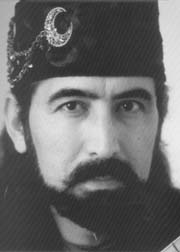
Musical wisdom
To keep his music relevant to contemporary audiences, Turkish minstrel Latif Bolat seeks the wisdom of a man who lived nearly 800 years ago. The poetry of 13th century Persian sufi mystic Rumi, who, according to book sales, is now counted among America's most popular poets, figures prominently in Bolat's musical sets.
"They talk of the meaning of life and answering the question 'Why are we here?'" reveals Bolat, who will combine Rumi's ancient verses with music and a slide show for his upcoming performance at the Honolulu Academy of Arts' Doris Duke Theatre. "They warned us against the attraction to materialism and how you can become less connected to nature and the much more meaningful aspects of life."
COURTESY OF HONOLULU ACADEMY OF ARTS
Latif Bolat combines the poetry of Rumi with music and a slideshow for his multimedia presentation at the Honolulu Academy of Arts’ Doris Duke Theatre.
In a strife-ridden era that saw Persia invaded by the Crusaders and Mongols, Rumi's stirring poetry carried great significance. Generations later, his words still hold special meaning for modern cultures across the globe.
"I think it's because of the times we live in, especially with what's going on in the world with all these wars and things like that," explains Bolat. "Out of that darkness, his poetry and philosophy have given a lot of hope to people. I include a lot of poetry in my performance because it is very relevant to this music. The kind of music that I do has a lot of philosophical implications."
Bolat's stage presentation is a versatile one. He can accommodate audiences small and large in each city he visits, performing solo or backed by an ensemble that incorporates as many as 16 local Turkish musicians. Tomorrow's program will feature a five-piece combo and a pair of whirling dervishes, all of whom are Oahu residents he has come to know through his years as a traveling performer. Slides of Turkey will add a visual component to the performance. "It's sort of a multi-dimensional, multimedia presentation," he states.
Each group member is given recorded copies of Bolat's music several months in advance to study. Though not dependent on improvisation, Bolat's format does allow his sidemen some freedom to embellish songs with a modicum of personal character.
Music, says Bolat, has been a lifelong love, one which he partly attributes to a remote uncle on his father's side, who played the saz, or Turkish lute. "Those days, no one had TV at home, and radio was the most entertaining thing. Whenever we would go to his house, halfway through the family conversation, he would bring out the instrument and sing. Seeing him create a beautiful atmosphere always appealed to me."
Geography also played a large role in defining Bolat's cosmopolitan sense of melody. "Because I lived on the Mediterranean coast, almost 60 or 70 miles from the island of Cyprus, there was a heavy Greek presence, Radio Athens from Greece had a very strong signal. Also Radio Beirut in Lebanon was very fashionable because, in those days, Beirut was like the Las Vegas of the Middle East. So very early, I was exposed to the ethnic and traditional music of other people. Radio Monte Carlo was truly an egalitarian, democratic radio station which played any kind of music, 24 hours a day. Actually, the first time I heard 'Let It Be' from the Beatles was from that radio station."
Bolat's native town of Mersin in Turkey was home to a diverse population consisting of Italians, Armenians, Arabs and Greeks, which also gave him an early lesson in multiculturalism. "Even though I didn't have the opportunity to travel then, listening to all this music was like traveling around the Mediterranean," he says. "It was a very democratic and progressive community. I appreciate growing up in that environment. Listening to other people's music, it hit me how different they were, but on the other hand, how genuine and similar they were. How similar we all are."
Latif Bolat Ensemble
Where: The Doris Duke Theatre, Honolulu Academy of Arts, 900 S. Beretania St.
When: 7:30 p.m. tomorrow
Tickets: $18, $15 students, military, seniors and Academy members
Call: 732-7717
Click for online
calendars and events.

